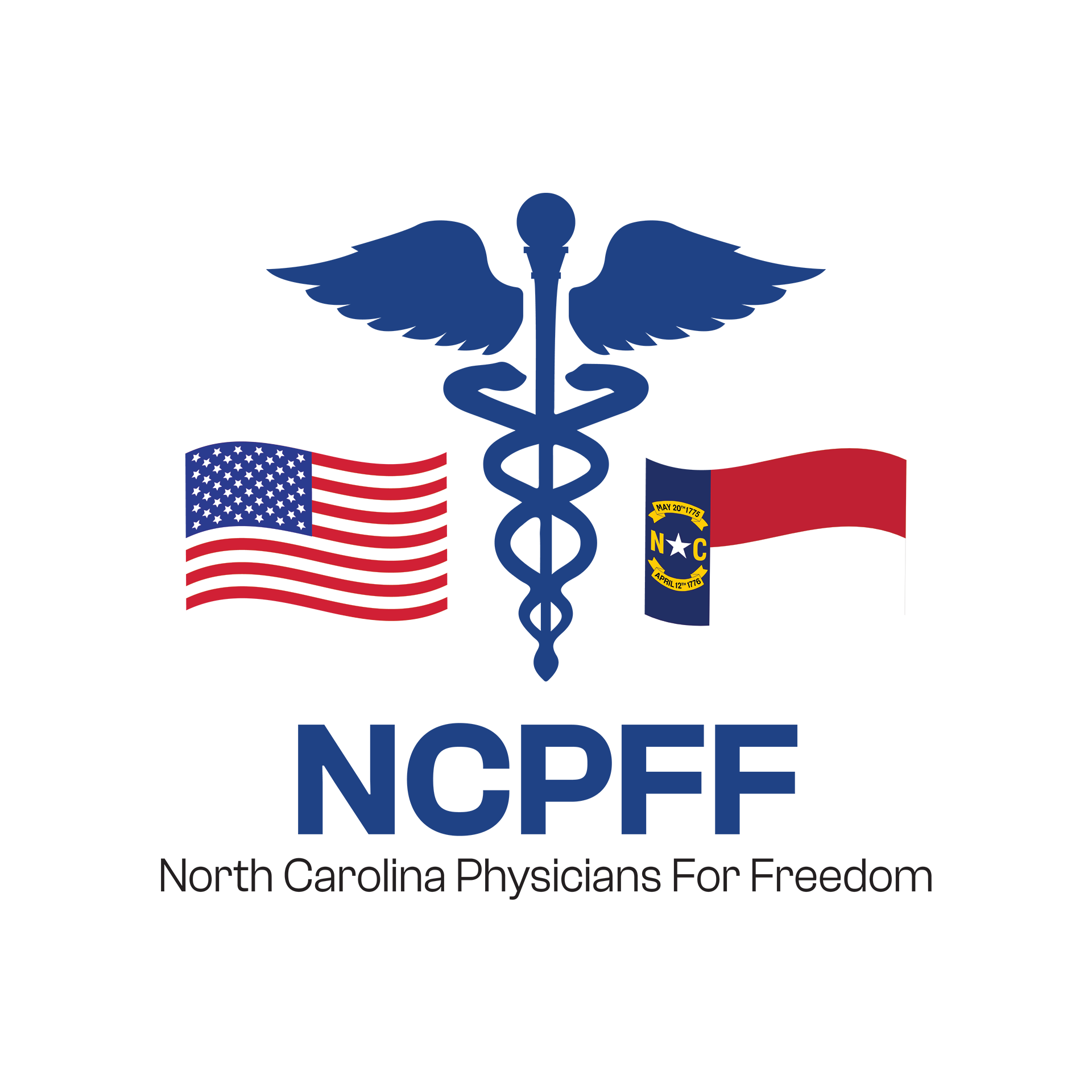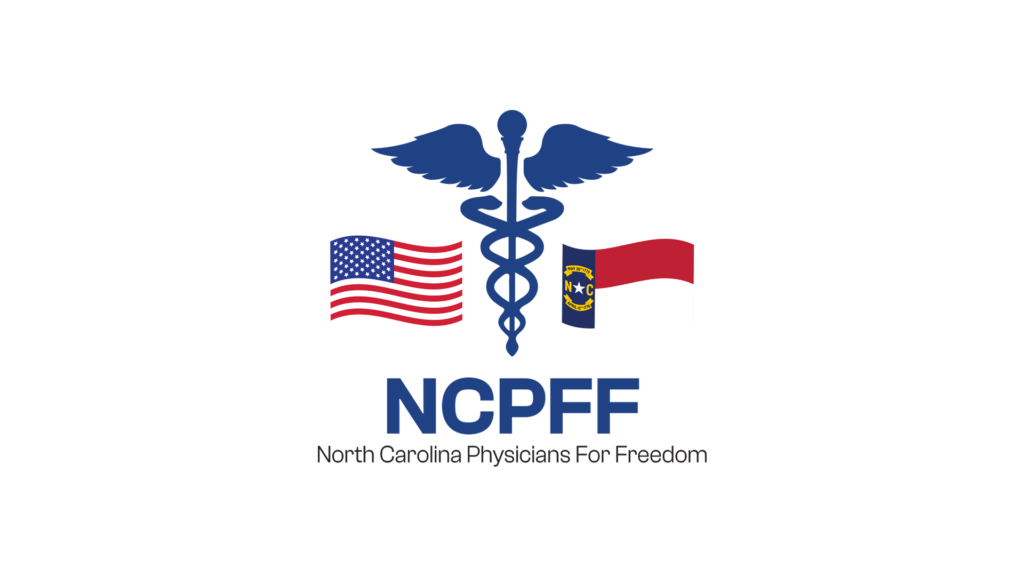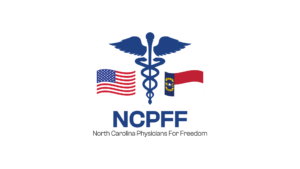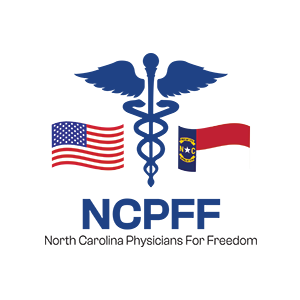September 14, 2023
North Carolina Physicians for Freedom consists of hundreds of practitioners throughout North Carolina. Since the onset of the COVID 19 pandemic, we have had major concerns that the physician-patient relationship was being inappropriately undermined in our state and nationwide.
In our opinion, the federal government’s response to the pandemic was one of the major contributors to the chaos and confusion that unfolded in the medical community. While threats to the physician-patient relationship had been germinating prior to the pandemic, the federal response assured there would be an outright assault on that relationship.
Our physicians believe that there are two main components of the federal response affecting this relationship that require correction before trust to these fractured relationships can be restored:
1. A lack of scientific integrity; and
2. A failure to adhere to the time-tested ethics of the field of public health.
From the outset of the pandemic, there was a tendency on the part of key federal officials to fan the flames of fear and hysteria. We understood by the end of March, 2020 that the case fatality rate associated with Covid-19 would be far less than one percent. Nevertheless, an extensive set of lockdown policies were communicated that resulted in physicians’ inability to see our patients in person.
The true fatality risk for various age groups was not accurately reported to the public. The physical examination of patients– and in-office tests and measurements– all fell by the wayside with the push to telemedicine, while a one-size-fits-all government cure was forced upon our patients and the public.
The unscientific use of models to predict transmission, as well as the improper use of diagnostic tests and reporting data, accentuated the fear and confusion, and reinforced lockdown policies. We knew that these policies would harm our patients, but were powerless to do anything about it.
Masks were ultimately recommended by the federal government, but the overall weight of the medical literature did not support this recommendation. This imposition affected the physician-patient relationship because it hindered communication and intensified the atmosphere of fear and misunderstanding.
Almost from the beginning, we also knew that certain early interventions and preventive measures would be helpful because we understood the basic pathophysiology of the illness. Yet, the federal response was strongly biased against early and preventive intervention from the outset; and this bias was communicated to the individual states. An atmosphere was created in which the right to treat patients was compromised, resulting in many needless deaths; this was a form of forced malpractice.
It was quite apparent that the key officials directing the pandemic response had no experience or training with regard to the public health approach for communicable disease control. This is a well-defined area of study within the field of public health with a long history of experience. Yet, these officials were ignorant of the knowledge base within the field on these questions.
Moreover, the field of public health has long had a well-defined set of ethical principles to which public health professionals are supposed to adhere. It was quite evident that the key federal officials responding to the pandemic had no knowledge of or regard for these ethical principles. These include autonomy; beneficence; non-maleficence; justice; and informed consent. Each one of these was violated repeatedly with various aspects of the federal pandemic response.
There was also a failure to exercise restraint and to employ the least restrictive options, resulting in a profound lack of oversight and accountability for decisions made.
Public health practitioners at the federal level were neither truthful nor transparent. The most glaring example of this was the failure to notify practicing physicians and the public regarding the relatively high rates of severe adverse vaccine reactions and complications. These were uncovered during the early clinical trials and in the VAERS system, but were not communicated. This resulted in a major threat to the welfare of our patients and an intrinsic violation of the ethical principle of informed consent. Many of our patients did not need this vaccine, but many of us were intentionally left “out of the loop” when decisions were made because vaccines were administered by hospital systems and chain pharmacies. Furthermore, many of us felt we could not advocate for our patient’s best interests because of the atmosphere created by the federal government against physician’s freedom of speech.
Risk communication was also a major shortcoming of the federal response. The risks associated with the illness itself; with early and preventive treatment; with hospital treatments; and with the vaccines were all inaccurately represented to the public. This negatively impacted our ability to help our patients; and in many cases our patients were gravely harmed–or died.
Trust was shattered with large segments of the population and within the healthcare industry because of the federal response. But establishing and maintaining trust is supposed to be one of public health’s primary concerns.
One of the best practices to which public health practitioners are supposed to adhere is to assure that the constitutional rights and civil liberties of citizens are not violated. But the federal response invited massive constitutional violations by state governments. We were able to tabulate approximately 6-7 constitutional rights and civil liberties that were routinely violated. When free speech rights of physicians are curtailed—as was rampant during the pandemic—patients’ rights are compromised.
Finally, public health practitioners must accurately assess for each intervention the risk/benefit ratio associated with that particular intervention. This was a major issue for the federal response from the standpoint of early and preventive treatment; the vaccines; certain types of hospital treatment paid for by the federal government; and the lockdowns.
Many members in NCPFF’s network have been extremely concerned about the ineffective, harmful approaches to hospital treatment that we know were incentivized by the federal government. Once again, the physician-patient relationship was severed because physicians were usually not free to treat patients outside of these predetermined protocols.
Our position is that patient rights and the physician-patient relationship were systematically and repeatedly violated because of all the circumstances noted above. We urge that action be taken to assure these egregious mistakes are not committed once again.





